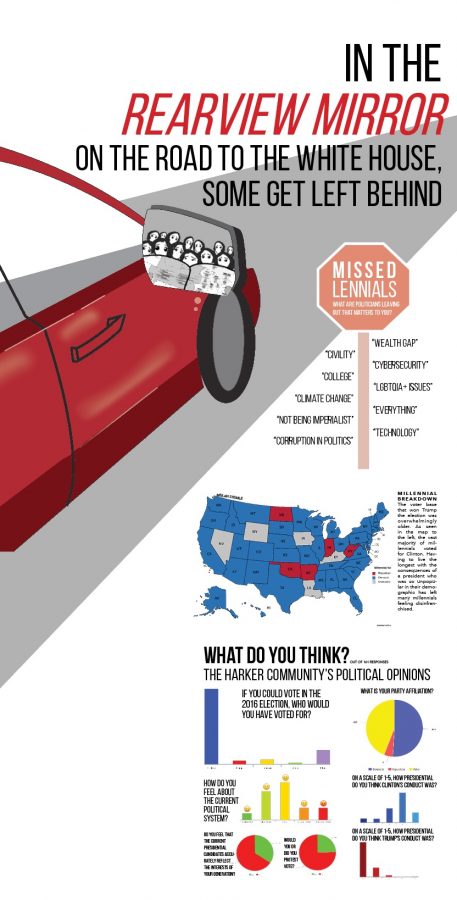Presidential election sparks disillusionment in millennial generation
The Presidential election results sparked disillusionment with millennials. The Harker Community took a poll on who they would have voted for if they were eligible.
November 16, 2016
In an upset of almost every preliminary forecast, Donald Trump was elected president last Tuesday, in the completion to a long and contentious election season.
According to a CBS/New York Times poll, both Democratic candidate Hillary Clinton and Republican candidate Donald Trump had the highest unfavorability percentages of 52 and 57 percent, respectively, since 1984, when CBS began polling voters. Robert Varich, vice chair of the the executive committee of the Santa Clara Republican party, believes that the disillusionment and low approval ratings come from a sense of frustration.
“On one hand, the Democratic candidate was crowned early, and it was the only choice the democrats really had,” he said. “On the Republic side, people were just frustrated by all the things that were being implemented without compromise.”
The disillusionment that may have caused such low approval ratings extends even more to youth. An article in the Portland Press Herald mentioned that a poll of people ages 18 to 30 showed that 90 percent felt the American political system was “broken.”
This feeling of a political disillusionment among youth reached its crux in July, when anti-institution, democratic millennial favorite Sen. Bernie Sanders of Vermont dropped out of the race in the wake of controversy regarding the Democratic National Committee (DNC).
“I think it’s probably going to lead to be an uprising of [millennials]. There will be a Sanders candidate in four years, and there better not be any collusion of any political parties to make that person be squashed,” Varich said. “I think it changed some of the things that Secretary Clinton was talking about because she saw how important it was to Sanders voters.”
After emails were leaked and published from officials in the DNC revealing bias against Sanders and his campaign, it led to the resignation of Debbie Wasserman Schultz from the chair of the committee.
“Sure [Bernie Sander’s] policies seemed very radical to some, but in my opinion those are needed in this society, especially on education reform and the environmental issue, those were things that some other politicians drew away from, but he instead embraced them and that spoke to a lot of millennials,” Bernie Sanders supporter, Sumi Wadhwa (11) said. “I think it was really unfortunate the way that everything turned out, especially with the DNC and everything that happened, and Debbie Wasserman Schultz, this whole thing against him from the beginning, I thought this was a horrible way, because its democracy its for the people it’s by the people but by doing this they proved otherwise.”
The controversy that surrounded the DNC affair over the summer led many millennials to evaluate the election system’s effectiveness and integrity, contributing even more to existing disillusioned feelings of a dysfunctional, in transparent government.
“I think this election is proof that our system is far from perfect and very flawed and can really have bias and tendencies to sway in the wrong direction,” Clinton campaign member Haris Hosseini (10) said. “This election has been enormous disappointment, in terms of [Sanders] supporters, [Clinton] supporters and probably even Trump supporters too. I think it’s the most exhausting election cycle in American history.”
For the 2016 election, there emerged a large shift in focus from the public being interested in political policies to the candidate’s personality and values. The unique nature of both candidates may have contributed to growing disillusionment.
“These are two unique personalities—you have the first female candidate to be nominated by a major party, and you have a non-major politician to be nominated on the other side,” AP U.S. Government and Politics teacher Carol Green said. “A lot of those traditional talking points have gone out the window, and that means you have people voting more on personality more than they ever have before, and you have people who are voting against personality and against history without it necessarily being policy-based history.”
The growing emphasis on the relationship between candidates and their supporters also creates opportunity for a pessimistic campaigning system.
“While young people were motivated and are still motivated for some campaigns, I think that the way the politics have turned to become so personal and less policy-oriented has lifted a veil for a lot of our youth,” Green said. “[Students] immediately go to hating on personalities or go to thinking that it’s such a broken system that can’t be fixed, so I think in looking at all the negative campaigning on both sides, it’s just something negative and nasty, and people just don’t want to embrace that.”
Even in the midst of disillusionment and dissatisfaction, young people have shown a higher degree of engagement than ever before in this election cycle, contributing to a more widespread and shared political experience among all ages.
“I would say that this group is more engaged, disillusionment implies that there was illusionment at one point, and what I mean by that is that you would have to have been engaged at some point to be disillusioned,” said modern world affairs and AP economics and history teacher Damon Hallback. “If you are just cynical without knowing anything, I don’t think that disillusionment is the right word, so the level of engagement that many young American supporters have engaged in during the primaries is unusual actually, and points to a higher degree of interest in political affairs than previous voting cohorts, where there is apathy, I think disillusion is quite different from apathy.”
Even though young voters may feel misrepresented and disillusioned, there are ways in which young people can contribute to the political process that do not involve voting.
“I was like ‘I’m going to speak even though I can’t vote,’ so I think that’s the best way for young people who can’t vote yet to influence voting, is just to keep talking, keep researching, making sure you’re informed, I think that’s the most important thing because it’s about making informed decisions,” Clinton campaign correspondents intern Shannon Hong (‘16) said. “You [also] can’t let the facts get in the way of your humanity. Even if you believe you are right, you can’t convince people unless you understand that they too are human, and they too believe in the facts that they see, and the only way to convince people or to create compromise or to create change is to bring people together.”
This piece was originally published in the pages of The Winged Post on November 16, 2016.


















![“[Building nerf blasters] became this outlet of creativity for me that hasn't been matched by anything else. The process [of] making a build complete to your desire is such a painstakingly difficult process, but I've had to learn from [the skills needed from] soldering to proper painting. There's so many different options for everything, if you think about it, it exists. The best part is [that] if it doesn't exist, you can build it yourself," Ishaan Parate said.](https://harkeraquila.com/wp-content/uploads/2022/08/DSC_8149-900x604.jpg)




![“When I came into high school, I was ready to be a follower. But DECA was a game changer for me. It helped me overcome my fear of public speaking, and it's played such a major role in who I've become today. To be able to successfully lead a chapter of 150 students, an officer team and be one of the upperclassmen I once really admired is something I'm [really] proud of,” Anvitha Tummala ('21) said.](https://harkeraquila.com/wp-content/uploads/2021/07/Screen-Shot-2021-07-25-at-9.50.05-AM-900x594.png)







![“I think getting up in the morning and having a sense of purpose [is exciting]. I think without a certain amount of drive, life is kind of obsolete and mundane, and I think having that every single day is what makes each day unique and kind of makes life exciting,” Neymika Jain (12) said.](https://harkeraquila.com/wp-content/uploads/2017/06/Screen-Shot-2017-06-03-at-4.54.16-PM.png)








![“My slogan is ‘slow feet, don’t eat, and I’m hungry.’ You need to run fast to get where you are–you aren't going to get those championships if you aren't fast,” Angel Cervantes (12) said. “I want to do well in school on my tests and in track and win championships for my team. I live by that, [and] I can do that anywhere: in the classroom or on the field.”](https://harkeraquila.com/wp-content/uploads/2018/06/DSC5146-900x601.jpg)
![“[Volleyball has] taught me how to fall correctly, and another thing it taught is that you don’t have to be the best at something to be good at it. If you just hit the ball in a smart way, then it still scores points and you’re good at it. You could be a background player and still make a much bigger impact on the team than you would think,” Anya Gert (’20) said.](https://harkeraquila.com/wp-content/uploads/2020/06/AnnaGert_JinTuan_HoHPhotoEdited-600x900.jpeg)

![“I'm not nearly there yet, but [my confidence has] definitely been getting better since I was pretty shy and timid coming into Harker my freshman year. I know that there's a lot of people that are really confident in what they do, and I really admire them. Everyone's so driven and that has really pushed me to kind of try to find my own place in high school and be more confident,” Alyssa Huang (’20) said.](https://harkeraquila.com/wp-content/uploads/2020/06/AlyssaHuang_EmilyChen_HoHPhoto-900x749.jpeg)











